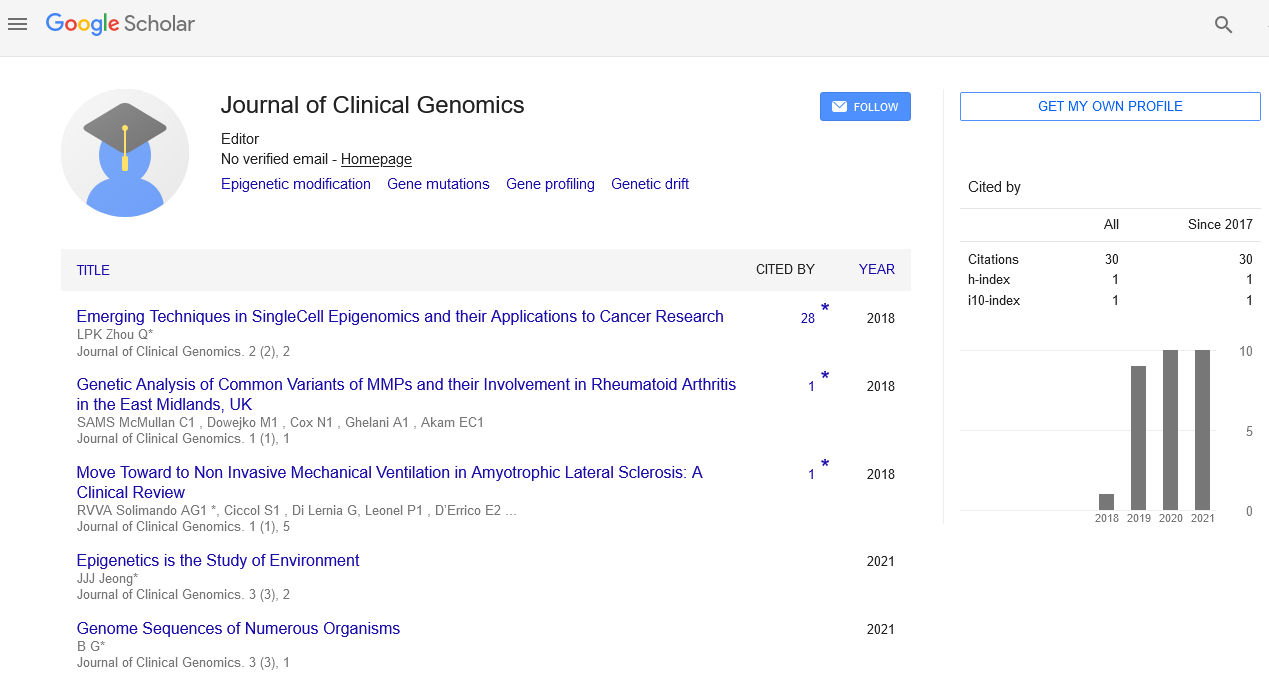Perspective, J Clin Genom Vol: 5 Issue: 2
Metaproteomics Analysis of Gut Microbiota in Inflammatory Bowel Disease Patients
Katherine Stark*
1Department of Genomics, University of New South Wales, Sydney, Australia
*Corresponding Author: Katherine Stark,
Department of Genomics, University of New South Wales, Sydney, Australia
E-mail: katherin@rfty.au
Received date: 25 May, 2023, Manuscript No. JCG-23-107411;
Editor assigned date: 29 May, 2023, PreQC No. JCG-23-107411 (PQ);
Reviewed date: 14 June, 2023, QC No. JCG-23-107411;
Revised date: 21 June, 2023, Manuscript No. JCG-23-107411 (R);
Published date: 28 June, 2023 DOI: 10.4172/JCG.1000129
Citation: Stark K (2023) Metaproteomics Analysis of Gut Microbiota in Inflammatory Bowel Disease Patients. J Clin Genom 5:2.
Description
Inflammatory Bowel Disease (IBD) is a chronic and debilitating disorder characterized by inflammation of the gastrointestinal tract. The exact cause of IBD remains elusive, but growing evidence suggests that alterations in the gut microbiota play a crucial role in its pathogenesis. Metaproteomics a powerful technique that allows the study of the collective protein expression of the gut microbiota has emerged as a promising tool in understanding the microbial dynamics in IBD.
This involves the large-scale identification and quantification of proteins from complex microbial communities, such as those residing in the human gut. This approach enables researchers to gain insights into the functional activities of the gut microbiota. Traditional methods, such as 16 S rRNA gene sequencing, provide information on microbial diversity but lack functional context. Metaproteomics, on the other hand, reveals functional changes in the gut microbiota, shedding light on the role of these microbes in health and disease.
Dysbiosis refers to an imbalance in the composition and function of the gut microbiota. In IBD patients, dysbiosis is a common feature characterized by reduced diversity and altered relative abundance of specific microbial taxa. Metaproteomics allows us to understand the consequences of dysbiosis on the gut microbial functions in IBD. By analyzing the proteins expressed by different microbial groups, researchers can uncover the metabolic pathways that are affected, potentially contributing to IBD pathogenesis. Early diagnosis and timely intervention are crucial in managing IBD. It offers the opportunity to identify specific protein biomarkers associated with IBD. These biomarkers may not only aid in early detection but also provide valuable information about disease severity and prognosis. Furthermore, monitoring changes in the gut microbiota proteome during the course of the disease can help gauge the effectiveness of therapeutic interventions.
The gut microbiota is in constant communication with the host immune system and epithelial cells. It can provide detailed insights into the interactions between the gut microbiota and the host, including the mucosal immune response. Understanding these interactions is essential in comprehending the gut microbiota, influences the inflammatory processes in IBD. IBD is a highly heterogeneous disease and treatment responses vary among patients. Metaproteomics has the potential to advance personalized medicine by identifying patientspecific microbial signatures that can predict treatment outcomes.
Additionally, the functional information provided by metaproteomics can guide the development of novel therapeutic strategies, such as targeted antimicrobial therapies or the modulation of specific microbial functions. Despite its promise, metaproteomics analysis also faces challenges. The complexity of the gut microbiota and the vastness of the proteomic data make analysis and interpretation laborious and computationally demanding. Standardization of sample collection, processing, and data analysis is essential to ensure the reproducibility and comparability of results across different studies.
Looking ahead, advancements in technology and bioinformatics are likely to enhance the efficiency and accuracy of metaproteomics analysis. Integration of metaproteomics data with other "omics" data such as metagenomics and metabolomics will provide a more comprehensive understanding of the gut microbial ecosystem in IBD. As the field continues to advance metaproteomics is likely to play a pivotal role in unraveling the complex interactions between the gut microbiota and the host, shaping the future of IBD research and clinical management.
 Spanish
Spanish  Chinese
Chinese  Russian
Russian  German
German  French
French  Japanese
Japanese  Portuguese
Portuguese  Hindi
Hindi 